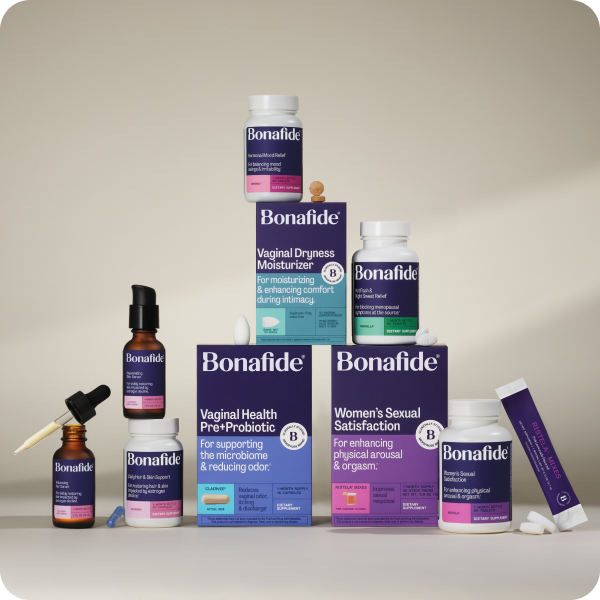As you sort through your Google search results in an attempt to learn how to better support your body during the menopausal transition, you’re likely to come across the term “phytoestrogens” for menopause symptoms, at least once.
But what exactly are phytoestrogens, and can they really help with the management of menopause symptoms? And if so, do the benefits outweigh the risks? Understanding phytoestrogens—including the science behind them and the risk factors associated with them—can help you decide if they are right for you. Let’s dive right in.
What are Phytoestrogens?
Phytoestrogens are plant-derived compounds that have the ability to mimic the effects of estrogen in the body. This makes them endocrine disruptors, meaning they can disrupt normal hormone function.1
There are many different types of phytoestrogens but isoflavones and lignans are among the most common (and the most studied).
- Isoflavones are flavonoids, a category of nutrients known for its potential to protect cells from oxidation and reduce inflammation, among other benefits.2 Soybeans and foods made from soy, such as tofu and tempeh, are a primary source of isoflavones. Soy isoflavones can mimic estrogen’s effects in some parts of the body, while blocking the effects of estrogen in others.3
- Lignans are chemical compounds with antioxidant and anti-inflammatory properties that are structurally similar to the hormone estradiol.4 Nuts, seeds and whole grains, such as oats and barley, are rich in lignans.
Other dietary sources of phytoestrogens include:5
- Prunes, dates and other dried fruits
- Berries
- Cruciferous vegetables, (part of the cabbage family) such as broccoli and brussels sprouts
- Legumes such as chickpeas and lentils
Phytoestrogens can also be found in certain dietary supplements, in the form of capsules and tablets, including some specifically marketed toward women who are going through perimenopause or menopause. Popular phytoestrogens that often come as supplements include black cohosh, evening primrose or red clover. These phytoestrogens can also include topical products, in the form of creams and gels.6
How Do Phytoestrogens Work?
The chemical structure of phytoestrogens is very similar to that of the estrogen produced naturally by our bodies. For this reason, estrogen receptors in the body recognize and can respond to phytoestrogens as if they were estrogen.7
But the bond of phytoestrogens to estrogen receptors isn’t quite as strong as the one that occurs with natural estrogen, so their effects in the body may be weaker as well.8
Can Phytoestrogens Help with Perimenopause or Menopause Symptoms?
Phytoestrogens have been studied for their potential to make the menopausal transition easier, and certain scientific studies suggest they may help with the management of some perimenopause or menopause symptoms.
For example, one study found phytoestrogens reduced the frequency of hot flashes and night sweats in menopausal women.9
Another more recent study found that phytoestrogens may be helpful for relieving urogenital symptoms, such as vaginal atrophy and dryness, that commonly occur during menopause.10
It’s important to note that findings associated with the use and perceived benefits of phytoestrogens, regarding the management of menopause symptoms, are mixed. Some study results show beneficial results tied to phytoestrogen use, while others show they have little to no impact versus placebo. More research needs to be conducted to better understand the effectiveness of phytoestrogens for the management of perimenopause or menopause symptoms.11
Are Phytoestrogens Safe?
Because they disrupt the body’s normal hormone function, phytoestrogens may not be the best choice for women who are hoping to avoid products that have hormone-like impacts in the body, for addressing their menopause symptoms – either because of a fear of potential side effects, a restrictive medical history, at their healthcare provider’s suggestion or just wanting a “hormone-free” option.
A growing body of evidence indicates that women with cancer, more specifically those with HER-2-positive tumors, in addition to premenopausal women who are at high risk for breast cancer, should avoid phytoestrogens, since these estrogen-like compounds may further increase cancer risk.12 Additionally, prolonged, or excessive use of certain phytoestrogen supplements, like black cohosh, mentioned earlier, may also alter liver function.13
Because of potential risks, it’s strongly recommended that women check with a healthcare provider before using any product—topical or internal—that contains phytoestrogens.
Hormone-Free Alternatives to Phytoestrogens
For women who can’t or don’t want to use phytoestrogens to ease their menopause symptoms, there are many alternatives that have been scientifically shown to be beneficial without hormonal effects, and do not work through hormonal pathways in the body.
These options can range from prescription medications, like certain antidepressants or SSRIs, the newly approved fezolinetant, which works to block a specific brain chemical that trigger hot flashes and night sweats, or alternative over the counter options, that don’t work through hormonal pathways. As always, be sure to speak with your healthcare provider first to determine which treatment option is best for you based on your symptoms.
Resources
- https://www.medicalnewstoday.com/articles/320630#how-they-work
- https://www.ncbi.nlm.nih.gov/pmc/articles/PMC4924202/
- https://lpi.oregonstate.edu/mic/dietary-factors/phytochemicals/soy-isoflavones
- https://www.uspharmacist.com/article/focus-on-phytoestrogens
- https://www.healthline.com/nutrition/foods-with-estrogen#TOC_TITLE_HDR_4
- https://www.healthline.com/health/phytoestrogens#foods
- https://www.medicalnewstoday.com/articles/320630#how-they-work
- https://pubmed.ncbi.nlm.nih.gov/16965913/
- https://www.tandfonline.com/doi/full/10.3109/13697137.2014.966241
- https://www.sciencedirect.com/science/article/abs/pii/S0301211521001597
- https://www.menopause.org/docs/default-source/professional/2023-nonhormone-therapy-position-statement.pdf
- https://www.bcpp.org/resource/phytoestrogens/#:~:text=While%20evidence%20is%20still%20growing,breast%20cancer%20should%20avoid%20phytoestrogens
- https://www.webmd.com/vitamins/ai/ingredientmono-857/black-cohosh










